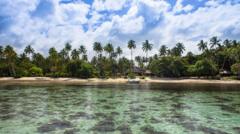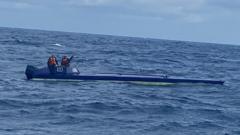This article discusses Australia's significant investment in Papua New Guinea's rugby league team as a strategic diplomatic effort that intersects sports, security, and international relations.
**Australia Leverages Rugby to Strengthen Ties with Papua New Guinea While Countering China's Influence**

**Australia Leverages Rugby to Strengthen Ties with Papua New Guinea While Countering China's Influence**
Australia's national rugby league pact with Papua New Guinea marks a strategic move to solidify regional influence and address security concerns tied to China's presence.
Australia has signed a groundbreaking agreement with Papua New Guinea (PNG) to allow the Pacific nation to join the National Rugby League (NRL) in 2028, marking a pivotal moment in the relationship between the two countries. This development comes alongside an A$600 million (£301 million, $384 million) investment aimed at fostering grassroots rugby in PNG and throughout the Pacific region. However, this partnership bears notable conditions; in return for this financial support, PNG has pledged not to pursue security agreements with China, a nation that has been vying for influence in the Pacific.
The dual agreement was publicized recently in Sydney, with PNG Prime Minister James Marape heralding the partnership as a "monumental" opportunity to not only strengthen ties between his nation and Australia but also promote unity within PNG’s diverse population, which consists of over 800 language groups. Australian Prime Minister Anthony Albanese called it a landmark moment, emphasizing that PNG, where rugby league is the national sport, "deserves" its place in the league. The formation of the new team, which will be based in Port Moresby, introduces international expansion for the NRL, with the PNG outfit being the first foreign team aside from the longstanding New Zealand Warriors.
Experts in international relations describe this agreement as part of Australia’s broader strategy to use sports diplomacy to counter threats from Beijing while reinforcing its sovereignty in the Pacific. Stuart Murray, an Associate Professor at Bond University, categorizes the scale and ambition of these agreements as unprecedented. He posits that through the rugby league connection, Australia aims to foster various avenues for cooperation on trade, education, and critical issues like climate change.
Observers note the geopolitical backdrop of increased competition between Australia and China for influence in the region. Following China's 2022 policing deal with the Solomon Islands, Australia has intensively sought exclusive security partnerships across the Pacific, including recent agreements with Tuvalu and Nauru. Some analysts view the PNG sports deal as a strategic win, enhancing Australia’s foothold and exclusive relations in the Pacific, which had previously been viewed as elusive.
Still, while the bilateral agreements are framed as enhancing camaraderie, critics argue that the arrangement compromises PNG's autonomy, potentially limiting its engagement with other nations, especially China. Marape himself has rejected claims that this agreement would stifle relations with Asian partners, asserting that China remains a key trading and bilateral partner, although security ties would remain firmly aligned with Australia.
Overall, the dual agreements signify a notable evolution in Papua New Guinea-Australia relations, suggesting that future diplomatic engagements may increasingly intertwine sports with strategic policy objectives in the Pacific. This cooperative model may potentially redefine the terms of global diplomacy, particularly in contested regions like the Pacific, where both nations, facing rising competition from China, shift toward innovative approaches in international relations.




















